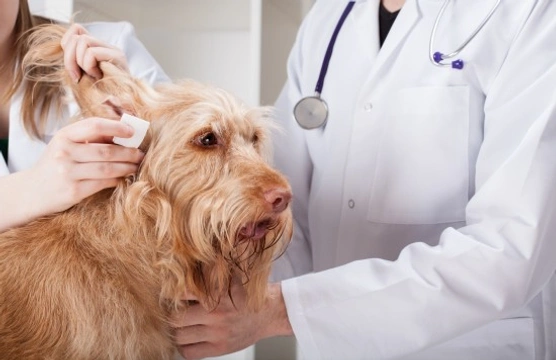
Otitis Externa in Dogs
What is Otitis Externa?
Otitis externa describes the inflammation of the ear canal. Dogs can also suffer from otitis media (inflammation of the middle ear), and otitis interna (inflammation of the inner ear; also known as labyrinthitis). Otitis externa is the most common of the 3 conditions.
What Causes Otitis Externa?
There are many possible causes which may include :
- Bacterial infection
- Fungal infection
- Ear mites (otodectes cynosis)
- Tumours (such as squamous cell carcinomas and melanomas, or benign lumps called polyps)
- Poor anatomical design
Some cases of otitis may be related to medical conditions where bacterial or fungal infection may cause secondary complications; e.g. food allergies, environmental allergies, injury or trauma, foreign bodies in the ear such as grass seeds and metabolic conditions such as hypothyroidism.
What Dogs are Most at Risk?
- Dogs diagnosed with, or suspected to be suffering from allergies
- Dogs with metabolic disease such as hypothyroidism
- Dogs with long, floppy ears
- Dogs with very hairy ear canals
- Collies and Shetland Sheepdogs who may be predisposed to inherited dermatomyositis (a rare inflammatory disease of the skin, muscles and blood vessels)
- Shar Peis and Westhighland White Terriers who may be predisposed to primary seborrhoea (a type of skin disease)
Symptoms
Symptoms may include :
- Malodour
- Irritation and itching
- Waxy discharge
- Head shaking (which can result in a complication called an aural haematoma – a swelling of blood/serum on the pinna of the ear)
- Inflammation of the ear canal
- Lethargy or irritability as a result of the discomfort
Any case of suspected otitis externa warrants prompt veterinary intervention as the sooner the condition is diagnosed, the sooner appropriate treatment can commence. This can help to minimise discomfort. It’s imperative to see your vet rather than attempt to treat the condition at home, because if you start cleaning the ears before you know the precise cause, if there is a foreign body present, it can be pushed further down and potentially cause a lot more damage. Also, your vet may wish to take a swab and if you have already cleaned the ears it may affect the true result. It’s important to start nutritional therapy as soon as possible too; particularly if the onset of the condition is suspected to stem from a dietary allergy. Untreated ear disease can result in damage to the ear drum and may cause deafness.
Diagnosing IBD
Whilst it is easy to identify otitis externa, it is not easy to diagnose the exact cause/s. Your vet will initially examine the ear using a tool called an otoscope; looking for evidence of a foreign body or tumours. Sedation may be required if the ears are very painful or the dog is very anxious. A swab can be taken to identify any bacteria or yeasts present, and a smear can be viewed under the microscope to look for ear mites.
Additional diagnostics such as blood tests may be required, particularly if the otitis is suspected to be symptomatic of an underlying problem. Food allergy testing may be undertaken, although it is still widely considered that feeding trials are the best way to diagnose this problem. Environmental allergy testing may also be necessary.
Therapy
Much depends on the root cause of the condition. Therapy may include :
- Topical and/or oral antibiotics in the event of bacterial infection
- Antifungal drugs for yeast infections
- Anti-inflammatory drug
- Ear cleaner
- Immunotherapy in the event of allergies
- Nutritional therapy in the event of food allergies
Supportive and appropriate nutrition is absolutely essential to the dog’s recovery if the otitis is suspected to be symptomatic of a food allergy.
Nutritional Management
A hypoallergenic diet is advised that is not only free from the most common ingredients responsible for adverse food reactions in dogs (namely gluten, beef and dairy products) but also one which does not include staples of the diet/s that the dog has been fed previously. So he needs both a novel protein source, and a novel carbohydrate source. If his previous diet was chicken, rice and oat based; then a good option would be a fish and potato based product. It can be hard to select commercial diets as they do often contain a lot of ingredients, and there may be others that are best avoided by your individual dog. Veterinary diets made from hydrolysed proteins are often used for food trials since they are non-allergenic. Hydrolysis is a special process that renders the protein into very tiny fractions that are of such a low molecular weight that they are too small to annoy the immune system. Some owners however do find they are too expensive, they may not be palatable to a particular dog, and some dogs could be intolerant to an ingredient within them (hydrolysed or not). Your vet will help you cover all avenues.
Here are some tips :
- Ask your vet to demonstrate how to apply ear drops if necessary and how to clean the ears properly.
- If a food allergy is suspected, don’t forget to review the ingredients in any treats or extras if given. Inappropriate additions to the diet can defeat the objective of a food trial.
- Prevent your dog from causing further irritation to his ears by discouraging him from scratching.



